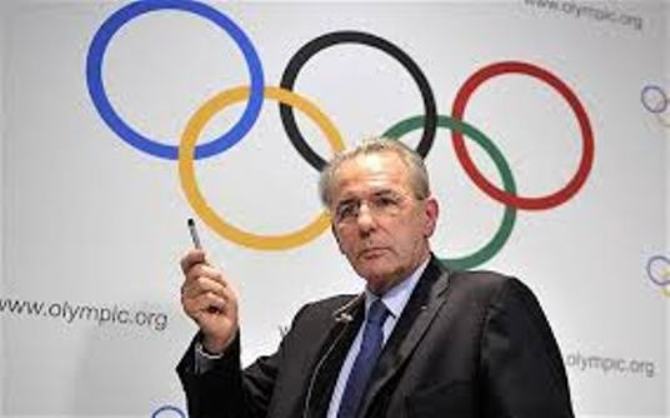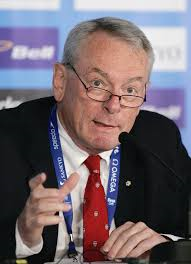
By what International Olympic Committee President Thomas Bach called a unanimous show-of-hands (not everyone raised a hand to vote) the IOC created the possibility for future summer or winter Olympic Games to take place in more than one country for money-saving reasons.
This change also applies to splitting the host role between two cities in the same country, which opens the possibility for a joint bid by two California cities, Los Angeles and San Francisco, which are among the four finalists in the likely U.S. candidature for the 2024 Summer Olympics.
That is unlikely, since IOC members – many already predisposed to disdain for the U.S. – undoubtedly would ask why cities of that size needed help to stage the Games.
The decision’s first impact could be on the Pyeongchang 2018 Winter Games, since the IOC has suggested the organizers move the sledding sports out of South Korea to save the expense of building a $100 million bobsled, Luge and skeleton facility in a country with no interest in those sports and likely no legacy use for the track.
Gunilla Lindberg of Sweden, chair of the IOC oversight commission for Pyeongchang, said sliding centers in the U.S., Canada, Europe and Japan would be alternatives.
The US Chief Executive of the International Luge Federation Svein Romstad sent a text stating “With the new policy in place, we shall see if either a bid committee or (organizing committee) approaches us with a desire to change a proposed venue.”
“To date, that has not Later in the morning, the IOC signed off on changes that would allow the Tokyo 2020 Olympic organizers to resurrect baseball and softball, pushed off the Olympic sports program after 2008.
If, as expected, Tokyo asks the IOC to add those sports, which are very popular in Japan, and possibly squash as well, the approval could come at the regularly scheduled IOC meeting in July.
“It is not sure for baseball and softball, because most other federations are against this,” Francesco Ricci Bitti, head of the Association of Summer International Sports Federations, told several Italian journalists.
The World Baseball Softball Federation reacted with predictable joy.
Several IOC members questioned for various reasons the wisdom of allowing a geographic diaspora of an Olympics, but a clear majority of the 96 members present at this special IOC meeting indicated they are on board with Bach’s entire reform program, called Agenda 2020.
“If there’s reasonable distance, neighboring countries for example, I think for the sake of sustainability and budget and those important other elements, it would be reasonable,” said IOC member Angela Ruggiero of the U.S., a four-time ice hockey Olympian.
The new rule, now part of the Olympic Charter, says “in exceptional cases,” entire sports or disciplines within sports can be staged outside the host country for reasons of “geography or sustainability.”
IOC rules previously allowed such flexibility in the Winter Games only if one country does not have adequate mountains, but no previous Winter Games ever has been split that way.
That nearly all the world connects to the Olympics via television or social media provides an argument that far-flung events in the same Games would have little impact on their audience.
Canada’s IOC member Richard Pound stated “If the Olympic unity of time and place exists only in the International Broadcast Center, you lose the essential magic of the Olympics, which is having all the athletes in the same place at the same time.”
John Coates, IOC Vice President of Australia said “Future Olympic bid cities must request such a two-country split in the earliest phase of the bid process.”
The IOC executive board would decide whether the necessary “exceptional case” requirements were met, which effectively becomes an unofficial endorsement or rejection of a bid’s worthiness.
It remains to be determined what would qualify as an exceptional case. The same questions about details will apply to many parts of the reform agenda.
“LA has shown it can do the Games all by itself. San Francisco has not yet. If they do a joint bid with L.A., is that an admission they can’t do it on their own?” Pound said.
The two-country Olympics idea was part of the IOC emphasis in reducing the cost of bidding for and staging the Olympics.
The need to do that became more pressing when several cities, including Oslo, Stockholm and Munich, dropped out of the race for the 2022 Olympics out of financial fears.
That leaves the IOC the unattractive situation of choosing between two finalists with considerable logistical and human rights issues: Beijing and Almaty, Kazakhstan.
The decision to allow flexibility in adding sports or events within sports will create an opportunity to bring in new sports with more appeal to younger fans, such as skateboarding, surfing, and rock climbing.
But, in the case of the Summer Games, maintaining limits of 10,500 athletes and 310 medal events could touch off an internecine battle among federations who may be forced to pare athletes and events in their sports.
Yet the 10,500 limit already has been more a guideline than a requirement. Since it was established after the total first passed 10,000 at the 1996 Atlanta Olympics, there have been as many as 10,901 (Beijing 2008).
“We got ourselves out of a real dead end, and I think that was really quite imaginative,” Pound said.
*The IOC will go ahead an Olympic Channel, hoping to get it up-and-running by the end of 2015 in an online format only at first. It will focus on historical footage, recreational and competitive sports training tips and features, with no immediate plan for any live competition.
The channel will cost $600 million over its first seven years and take at least 7-to-10 years to have a shot at breaking even.
The funding will come from several sources, with the IOC contributing $214 million and nearly all the rest from TV and sponsorship revenue the IOC distributes to national Olympic Committees and international sports federations.
Here’s hoping this works for those involved in sports!

Advertise With Sportswave

About Sportswave

SICAMOUS HOUSEBOATS

Delta Islanders Jr. A Lacrosse

North Delta Business Association








